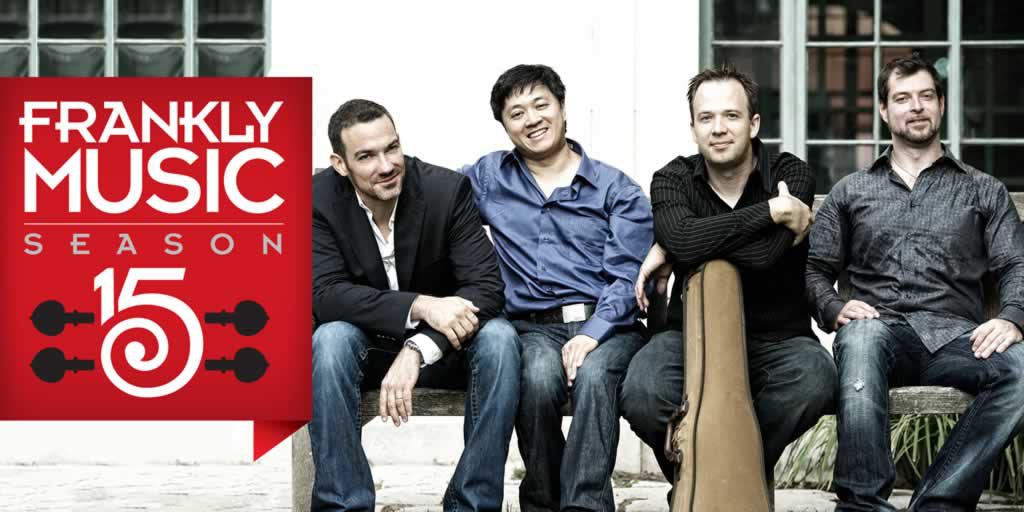A Lot of Love Music
Frankly Music plays works inspired by love by Mendelssohn, Schumann, Janáček.
The Frankly Music series offers an expanded 15th season with two concerts featuring guest ensembles. Next Monday evening marks the third visit of the Miró Quartet (violinists Daniel Ching and William Fedkenheuer, violist John Largess and cellist Joshua Gindele). They appeared in the series 2014 and 2017. (The other ensemble, Brooklyn Rider will visit this spring on April 8.)
Founded in 1995, the Miró Quartet was awarded first prize at several national and international competitions including the Baniff International String Quartet Competition and the Naumberg Chamber Music Competition. The ensemble has been in-residence at the University of Texas at Austin for 15 years. They support a strong chamber music program while maintaining a world-wide performance schedule of more than 80 concerts a year. Such arrangements are increasingly rare in a more challenging era for chamber music support.
Rather than focus their recording efforts on lesser known works, the Miró has tackled the heart of the string quartet repertoire – notably the early romantic period. They will soon be issuing a full set of Beethoven String Quartets. Their recordings of Schubert have attracted strong reviews. Grammaphone’s summary of their efforts seems apt: “The Miró’s approach to these epoch-making masterpieces is consistently animated and imaginative, often keenly driven though nearly always dispatched with a light touch.” For a sample of their style check this live recording of Schubert’s String Quartet in G, D887.
During the early romantic period of chamber music, composers often chose the string quartet as a vehicle to expose their most intimate feelings. This is certainly true of this selections for this concert.
At 17, Felix Mendelssohn‘s greatest works were already behind him. His Quartet in A minor, Op. 13 contains some echos of his Midsummer Night’s Dream and String Octet, but owes more to Beethoven’s late quartets. Critic Kai Christensen notes that “Mendelssohn was way ahead of his time in drawing inspiration from music considered inscrutable by many of his contemporaries.”
Christensen continues:
(Mendelssohn’s) Op. 13 makes several vivid references to Beethoven’s quartets. It is packed with intricate, extended contrapuntal imitation including numerous fugal entrances and a massive chromatic fugue in the second movement. The slow introduction, the surging primary themes, the poignant lyricism, the tonal effects and even the key signature point directly to (Beethoven’s) Op. 132.
Mendelssohn’s quartet incorporates the melody of a love song he had written. “Is it true?,” the song asks, “she who feels with me and stays ever faithful to me, eternally faithful.” The musical phrase “Ist es wahr?” is referenced in each movement. This early use of cyclic form unifies the work. The poetic link may be inspired by Beethoven’s musing in his Op. 135, “Muss es sein?” (Must it be?) An analyst writing for Wikipedia observes, “But, unlike the introspective, existential quality of Beethoven’s quartet, Mendelssohn’s work is passionate and richly romantic.”
Robert Schumann spent several tempestuous years, even in the courts, to overcome efforts by Clara Wieck‘s father to prevent their marriage. In a trip with Clara soon after their marriage, Schummann wrote his only three string quartets in just three months. Miró cellist Gindele observes that these quartets were “an homage to her … really passionate … with the notes pouring out the tip of this pen like a love song.”
Leoš Janáček embodies the spirit of 19th century romanticism most of all, even though he wrote his Quartet No. 2, “Intimate Letters” in 1925. Age 69 at the time, he was intensely in love with Kamila Stösslová, a married woman 38 years younger than he. Kamila’s response was more bemused than reciprocal. Still, Janáček’s infatuation fueled a remarkably productive spurt of writing.
In one of more than 70 letters to Kamila he wrote: “You know, we dream about paradise, about heaven and we never get to it. So I dream about you and I know that you are the unattainable sky.”
“Intimate Letters” set his feelings to music. The viola personifies Kamila. Milan Škampa of the Smetana Quartet has interpreted the third “letter”, or movement, as a lullaby for the son that Janáček and Kamila never had together.
Kevin Woods and David Lang have organized an analysis of this work, linking his letters to the score.
When the notes on the page represent such deeply personal reflections, the interpretive skills of an accomplished quartet are necessary to bring the works to life. The Miró Quartet is certain to offer that experience.
Monday’s October 29 concert will be held at 7:00 p.m. at St. Paul’s Episcopal Church, 914 E. Knapp St. in downtown Milwaukee. Tickets may be purchased online or at the door – $30, general seating and $10 student. Come early for the best seats and stay late for the creatively catered Frankly Music reception after the concert.
Frankly Music offers its next concert, The Voice of the Clarinet, on November 12 also at St. Paul’s Episcopal Church. The concert will feature clarinetist Todd Levy, violinist Frank Almond, pianist Brian Zeger, and soprano Susanna Phillips.
Preview
-
A Sacred Choir, 70 Voices Strong
 Dec 14th, 2025 by Martha Brown
Dec 14th, 2025 by Martha Brown
-
Prometheus Trio Goes Bohemian
 Dec 3rd, 2025 by Martha Brown
Dec 3rd, 2025 by Martha Brown
-
Present Music Offers New Choral Works
 Nov 20th, 2025 by Michael Barndt
Nov 20th, 2025 by Michael Barndt





















